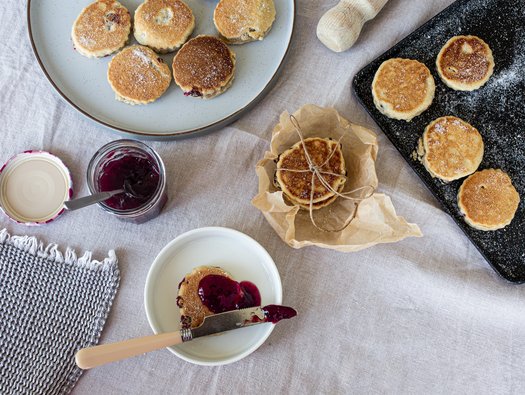Cranberry Welsh cakes

A kidney-friendly twist on a traditional Welsh cake – low in potassium, phosphate and salt.

A kidney-friendly twist on a traditional Welsh cake – low in potassium, phosphate and salt.
225g plain flour
75g caster sugar
½ teaspoon mixed spice
¼ Teaspoon Bicarbonate of Soda
¼ Teaspoon Cream of Tartar
100g unsalted butter (cold and cut into cubes)
1 egg, beaten
30g dried cranberries
1 teaspoon sunflower oil
10g caster sugar
Butter and/or jam (optional)
Place the flour, sugar, mixed spice, bicarbonate of soda and cream of tartar into a large bowl. Rub in the butter with your fingertips until it resembles breadcrumbs. Work the egg into the mixture with a knife until it comes together, adding a splash of milk if it’s a little dry. Once the mixture has all come together, mix in the cranberries.
Tip the dough out onto a floured surface and knead with your hands for a couple of minutes. Then use a floured rolling pin to roll out the mixture to the thickness of 1cm. Cut out into rounds using a 6cm cutter.
Pour a little of the oil into a heavy frying pan and place over a medium-high heat. Fry the cakes in batches, depending on size of pan, for about 3 minutes per side until golden brown and cooked through.
Place on a cooling rack and sprinkle with sugar on both sides.
Enjoy warm, or cold. Can be served with butter and/or jam.
The flour and sugar are the main sources of carbohydrate in this recipe, and the value has been provided for those who have been trained in insulin adjustment. If adding jam, you may need to adjust your dose to account for its sugar content.
This recipe is low in potassium if you follow the ingredient amounts and serving sizes, so it's suitable for people who need to eat less potassium. We used cranberries instead of sultanas, raisins or currants because they have less potassium. But even if you use those other dried fruits, the recipe is still low in potassium.
This recipe is also low in phosphate, however it does contain some phosphate, mainly provided by the egg, therefore if you have been prescribed a phosphate binder you should take as directed.
This recipe is low in protein, therefore suitable for those advised to eat less protein.
Although bicarbonate of soda and cream of tartar are not commonly used in most baking recipes, we have included them as alternatives to baking powder or self-raising flour. They are suitable for kidney-friendly baking and can be used in various other Kidney Kitchen recipes.
Use gluten free plain flour and ½ teaspoon of Xanthum Gum
These are a sweet treat and should be enjoyed in moderation as part of a healthy, balanced diet.
This dish is best eaten warm when freshly made, but they will keep in an airtight container for up to 2 days. Gently warm to eat either in an oven or microwave.
By giving us your email address, you're giving us permission to send you the latest news from Kidney Care UK. Further information about how we protect and use your personal data is available in our Privacy policy. If you would like to change the way we communicate with you at any time please email [email protected]. You can unsubscribe at any time by using the link at the bottom of every email we send.